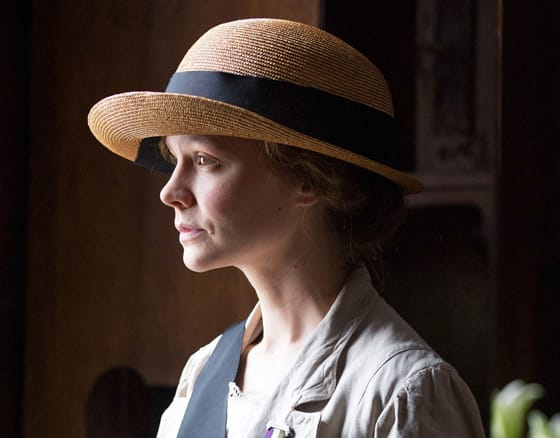Suffragette, a film about the British women's suffrage movement of the early 20th century, features mostly fictional characters, but still feels authentic. For nearly two hours, director Sarah Gavron subjects her audience to the suffering so many brave British women went through as they fought for their right to vote and have their voices heard. It's a difficult watch.
Carey Mulligan (An Education) stars as Maud Watts, a wife and mother who has worked in a laundry factory since she was a young girl. Her mother died when she was four years old; she was sexually abused throughout her childhood and adolescence; and when she inadvertently gets caught up in the suffrage movement, she is turned away by her husband (Ben Wishaw) and made to live on the streets. And this is just one woman's story we have to bear witness to. We also watch the suffragettes, including Helena Bonham Carter and Meryl Streep (who is only on screen for about five minutes), throw rocks through windows and blow up mailboxes just to get the government to notice them, pointing to the desperate measures often required for fundamental social and political change. That Gavron so vividly depicts the struggles of these women is admirable, but occasionally, it feels as though that focus means less time given to the political thought and philosophies that provided the crux of the movement.
Still, while Suffragette occasionally struggles to tie all of its parts together, it resonates with today's social and political climate, in which women are still fighting for autonomy over their bodies, equal wages and safety from harassment. In this way, Suffragette still feels like a valuable addition to an ongoing conversation.
(Universal)Carey Mulligan (An Education) stars as Maud Watts, a wife and mother who has worked in a laundry factory since she was a young girl. Her mother died when she was four years old; she was sexually abused throughout her childhood and adolescence; and when she inadvertently gets caught up in the suffrage movement, she is turned away by her husband (Ben Wishaw) and made to live on the streets. And this is just one woman's story we have to bear witness to. We also watch the suffragettes, including Helena Bonham Carter and Meryl Streep (who is only on screen for about five minutes), throw rocks through windows and blow up mailboxes just to get the government to notice them, pointing to the desperate measures often required for fundamental social and political change. That Gavron so vividly depicts the struggles of these women is admirable, but occasionally, it feels as though that focus means less time given to the political thought and philosophies that provided the crux of the movement.
Still, while Suffragette occasionally struggles to tie all of its parts together, it resonates with today's social and political climate, in which women are still fighting for autonomy over their bodies, equal wages and safety from harassment. In this way, Suffragette still feels like a valuable addition to an ongoing conversation.




